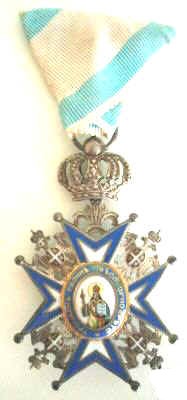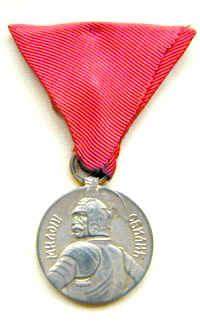| Their
role in the Balkans was to provide medical assistance to the Serbs in
their fight against the Austro-Hungarians, Germans and Bulgarians. King
quickly picked up the Serbian language and proved herself brave in the
face of Bulgarian fire when evacuating patients at Guevgueli, from which
she only just managed to escape. The allies retreated to Salonika, where
the SWH established a tent hospital. King remained here for the next two
and a half years, even after the SWH had left the country. She resigned
from this organisation in mid 1916 and enlisted in the Serbian Army as a
driver.
She was attached to the Headquarters
of the Medical Service and eventually rose to the rank of sergeant. She
had managed to retain "Ella", despite its broken springs and
mechanical problems (many of which she repaired herself) and it was one
of only three ambulances available to the Medical Headquarters unit,
thus earning the number plate C3. Towards the end of 1916, Olive King
contracted malaria and one of her most frequent visitors was Captain
Milan "Yovi" Yovitchitch, the Serbian Liaison Officer with the
British Army in Salonika. They fell in love and saw each other every day
until October 1917, when he was posted to London.
 |
Yovitchitch gave her a sterling silver
cigarette case as a memento of their affair, which had been the subject
of gossip around Salonika. King wrote to her father and sister
frequently (see "One Woman at War" edited by Hazel King) and
clearly enjoyed her job despite the danger and horror she witnessed.
She
frequently travelled to the front, transporting men and recovering
wounded. Her tireless efforts in evacuating civilians and medical stores
during the burning of the mainly wooden town of Salonika in August 1917
earned her the Serbian Silver Medal for Bravery. (see
right) |
 |
In 1918 her committed
work for the Serbians earned her the Gold Medal for Zealous
Conduct.
Before the war's end, supported by
over 10,000 pounds raised by her father in Sydney, she had established a
string of Australian Serbian Canteens to help displaced Serbian families
and soldiers. For this work King Alexander presented her with the
Samaritan Cross and the Cross of the Order of St Sava. (see
above left)
Back home after the war in 1923, Olive
put her energy into the Girl Guides Association, becoming State
Secretary and later Assistant State Commissioner (1932/42). She tried to
enlist as a driver during the Second World War but was deemed too old.
Instead she worked at the de Havilland Aircraft factory at Mascot
between 1942 and 1944 as a quality examiner.
Olive Kelso King died in 1958.
Some AWM images and text |